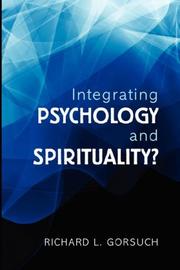| Listing 1 - 10 of 514 | << page >> |
Sort by
|

ISBN: 1599471248 9781599471242 Year: 2007 Publisher: Philadelphia: Templeton Foundation Press,
Abstract | Keywords | Export | Availability | Bookmark
 Loading...
Loading...Choose an application
- Reference Manager
- EndNote
- RefWorks (Direct export to RefWorks)

ISBN: 1881266265 9781881266266 Year: 2002 Publisher: Westport: Praeger,
Abstract | Keywords | Export | Availability | Bookmark
 Loading...
Loading...Choose an application
- Reference Manager
- EndNote
- RefWorks (Direct export to RefWorks)
Book
ISBN: 9783451281853 3451281856 Year: 2003 Publisher: Freiburg: Herder,
Abstract | Keywords | Export | Availability | Bookmark
 Loading...
Loading...Choose an application
- Reference Manager
- EndNote
- RefWorks (Direct export to RefWorks)
Book
Year: 2019 Publisher: Basel, Switzerland : MDPI - Multidisciplinary Digital Publishing Institute,
Abstract | Keywords | Export | Availability | Bookmark
 Loading...
Loading...Choose an application
- Reference Manager
- EndNote
- RefWorks (Direct export to RefWorks)
The interest in the topic of spirituality as a more or less independent dimension of quality of life is continuously growing, and research questions are beginning to change as the field of religiosity changes, becoming more diverse and pluralistic. Addressing new topics in health research also relies on standardized questionnaires. The number of instruments intended to measure specific aspects of spirituality is growing, and it is particularly difficult to evaluate the new instruments. This Special Issue will focus on some of the established instruments (updating them to different languages and cultures), but will also describe the features and intentions of newly-developed instruments, which may potentially be used in larger studies to develop knowledge relevant to spiritual care and practice. This Special Issue will serve as a resource on the instruments used to study the wide range of organized religiosity, the individual experience of the divine, and an open approach in the search for meaning and purpose in life.
Book
ISBN: 9780198728658 Year: 2015 Publisher: Oxford : ©2015 Oxford University Press,
Abstract | Keywords | Export | Availability | Bookmark
 Loading...
Loading...Choose an application
- Reference Manager
- EndNote
- RefWorks (Direct export to RefWorks)
The Abraham Dilemma: A Divine Delusion focuses on the topic of religious delusion - on the disorder's causes, contents, consequences, diagnosis and treatment. The title argues that we cannot understand a religious delusion without appreciating three facts. One is that religiosity or spirituality is a part of human nature, whether it takes theistic or non-theistic forms. Another is that religious delusion is something to which we are all vulnerable. The third is that the delusion is not best understood by reducing it to brain chemistry, or by insisting that it is empirically false. It is best understood by examining its harmful personal and moral consequences - consequences that nearly unfolded when the biblical patriarch Abraham prepared to sacrifice his son Isaac in response to a command, he thought, from God.
Book
ISBN: 2100830104 Year: 2021 Publisher: Paris : Dunod Editeur,
Abstract | Keywords | Export | Availability | Bookmark
 Loading...
Loading...Choose an application
- Reference Manager
- EndNote
- RefWorks (Direct export to RefWorks)
Depuis quelques années, de plus en plus de recherches en psychologie abordent la notion de spiritualité en la distinguant très clairement de la notion de religion. La spiritualité (qui peut ainsi être religieuse ou areligieuse) bénéficie donc maintenant de définitions scientifiques qui lui permettent de l'extraire du domaine de la pensée sociale et du sens commun, où elle est trop souvent malmenée et perçue sous un angle péjoratif. Cet ouvrage présente les travaux les plus récents de la psychologie scientifique menés sur la spiritualité et développe les dernières orientations sur cette thématique qui croise la question de l'émerveillement, de la connexion avec la nature, de la quête de sens, du sacré, du rapport au temps... La spiritualité est abordée à la fois au niveau conceptuel dans ses liens avec des espaces disciplinaires comme la psychologie existentielle ou la psychologie positive, et au niveau appliqué dans le monde de la santé, du travail, de la gérontologie ou de l'environnement.
Book
ISBN: 9783525310373 3525310374 Year: 2017 Publisher: Göttingen Vandenhoeck & Ruprecht
Abstract | Keywords | Export | Availability | Bookmark
 Loading...
Loading...Choose an application
- Reference Manager
- EndNote
- RefWorks (Direct export to RefWorks)
Book
ISBN: 9781666919158 9781666919165 Year: 2023 Publisher: Lanham Lexington Books
Abstract | Keywords | Export | Availability | Bookmark
 Loading...
Loading...Choose an application
- Reference Manager
- EndNote
- RefWorks (Direct export to RefWorks)
"This book demonstrates how the early religious development of several famous psychologists impacted their lives and work. It shows how this often-overlooked influence is present in both explicit and indirect ways in the thoughts and actions of Sigmund Freud, Carl Jung, Erik Erikson, B.F. Skinner, and Carl Rogers"--
Book
ISBN: 0878404295 Year: 1987 Publisher: Washington (D.C.): Georgetown university press
Abstract | Keywords | Export | Availability | Bookmark
 Loading...
Loading...Choose an application
- Reference Manager
- EndNote
- RefWorks (Direct export to RefWorks)
Book
ISBN: 0429913567 0429899335 0429474563 1782415173 9781782415176 9781781816493 1781816492 9781782203964 1782203966 Year: 2016 Publisher: London
Abstract | Keywords | Export | Availability | Bookmark
 Loading...
Loading...Choose an application
- Reference Manager
- EndNote
- RefWorks (Direct export to RefWorks)
False Bodies, True Selves explores the phenomenon of growing numbers of people in western society and beyond completely embedding their sense of identity in their appearance. Unlike other books which address either theoretical models of appearance-focused identity struggles or explore lived experiences of appearance-based battles, False Bodies delves into both. Importantly, the spiritual aspects of what it is to become enemies with one's body are given centre stage in the context of Donald Winnicott's theory of the true Self and the false Self. The book begins by looking at some of the myths, superstitions and fairy tales related to mirrors before moving on to western society's current obsession with appearance, which seems to have been compounded by the mass media. After looking at some of the most common manifestations of appearance-focused anguish including eating disorders and body dysmorphia, it begins to unpick the possible underlying meanings beneath such struggles with a particular emphasis on issues of a systemic nature.
| Listing 1 - 10 of 514 | << page >> |
Sort by
|

 Search
Search Feedback
Feedback About UniCat
About UniCat  Help
Help News
News